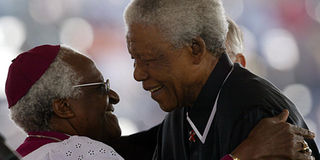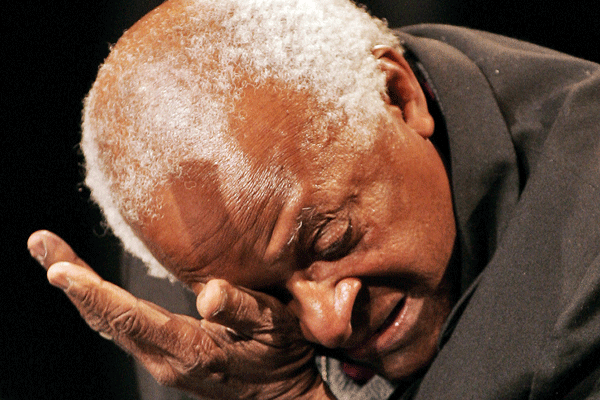Prime
Tutu and Mandela: Sometimes at odds, united against apartheid

Former South African President Nelson Mandela (R) hugs South African Anglican Bishop Desmond Tutu as they pay tribute to their late friend Walter Sisulu, at the apartheid struggle hero's state funeral in Soweto on May 17, 2003. PHOTO/ AFP
What you need to know:
- After Mandela emerged from jail 27 years later as apartheid crumbled, he stayed at Tutu's home on his first night of freedom.
A black and white image of the grinning pair taken around that time soon became iconic. - Tutu's death on Sunday at 90 plunged South Africa into mourning, eight years after the country lost Mandela, its iconic first black president, following a long battle with illness
Archbishop Desmond Tutu and Nelson Mandela forged a lifelong bond fighting together to end apartheid in South Africa, even if the two icons did not always agree.
Tutu's death on Sunday at 90 plunged South Africa into mourning, eight years after the country lost Mandela, its iconic first black president, following a long battle with illness.
The two men differed in many aspects from stature to tactics, but both separately became Nobel Peace laureates for their roles in ending white-majority rule.
"They had a complex relationship based on a similar sense of justice and a true friendship that allowed them to disagree on many things," said political analyst William Gumede.
Tutu, a short and charming Anglican clergyman committed to non-violence, used his religious robes as a shield against the apartheid regime.
Mandela, a tower of calm strength 13 years his senior, instead turned to armed struggle against the country's rulers, becoming South Africa's "public enemy number one".
Both men at different points in their lives lived a stone's throw away from each other on the same street in Johannesburg's Soweto township.
But they did not meet until they were adults, when Mandela was asked to judge a debate competition in which Tutu was participating before the activist stood trial for treason and sabotage in 1963 and was handed a life sentence.
'Major weakness'
After Mandela emerged from jail 27 years later as apartheid crumbled, he stayed at Tutu's home on his first night of freedom.
A black and white image of the grinning pair taken around that time soon became iconic.
When Mandela became South Africa's first black president in 1994, Tutu coined the term "Rainbow Nation" to describe the country.
At Mandela's request, he retired in 1996 to become head of the Truth and Reconciliation Commission, embarking on a harrowing journey to reveal the horrors of apartheid.
But as the country transitioned to multiracial democracy, the archbishop did not hesitate to call out his old friend.
Tutu despaired at the high salaries, cars and generous benefits ministers enjoyed during Mandela's single five-year term.
In a 2003 interview, Tutu said Mandela's one flaw was "his quite extraordinary degree of loyalty" when perhaps he should have shown certain ministers the door while president.
"I think that was a major weakness in someone who is practically flawless," he said.
But if he was ever ruffled, Mandela continued to value his friend's opinion.
"Madiba respected Tutu enough to go back as a friend and ask for his counsel," said Sello Hatang, head of the Nelson Mandela Foundation, using the late president's clan name.
'Loved and treasured'
Tutu's weariness towards politicians from the ruling African National Congress (ANC) only increased under Mandela's successors.
He criticised Thabo Mbeki's handling of the AIDS crisis and swore never again to vote for the party over rampant corruption under Jacob Zuma.
Relations had soured so much that when Mandela died in 2013 the ANC did not invite Tutu to the burial.
It was only after Tutu objected publicly that he was able to speak at a memorial service in Soweto's Soccer City stadium for the man he said he "loved and treasured".
The archbishop lauded Mandela for his commitment to creating a non-racist society and for his lack of bitterness towards his former oppressors.
He held many fond memories, recounting that Mandela spoke excitedly about his Mozambican wife Graca Machel, whom he married in 1998.
"His face is glowing, he's one of the best advertisements for love and marriage," he said.
In a tribute to Tutu on Twitter, South Africa's President Cyril Ramaphosa used Mandela's own words to describe the archbishop's impact on South African life.
"President Nelson Mandela said of him that his was a voice that was 'sometimes strident, often tender, never afraid, and seldom without humour'," he wrote.
Mandela was a fervent admirer.
"I believe that God is waiting for the archbishop. He is waiting to welcome Desmond Tutu with open arms," Mandela said.
"If Desmond gets to heaven and is denied entry, then none of the rest of us will get in!"





